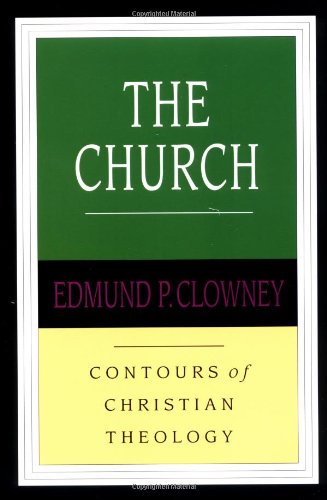A Book Review from Books At a Glance
by Mark Baker
It’s hard to find neutral ground in the doctrine of the church. Ecclesiology is not a pie-in-the-sky kind of doctrine; it’s a boots-on-the-ground, rubber-meets-the-road kind of doctrine. It’s a kind of doctrine that requires you to act this way and not that way. When it comes to ecclesiology, distinctions are a must. The late Edmund P. Clowney’s book, The Church, remains one of the best modern treatments on the subject, navigating potentially divisive waters with clarity and conviction, yet without unnecessarily dividing or alienating Christians who agree on primary doctrines.
Clowney devotes the first five chapters to a biblical theology of the church. As with most of the volumes in the Contours of Christian Theology series, the interplay between biblical and systematic theology stands out as an excellent feature. Writing from the Reformed Presbyterian tradition, Clowney focuses heavily on the continuity between the Old and New Testaments, claiming that the church is the fulfillment of Old Testament prophecy (37). Following the four-fold description of the church in the Nicene Creed, chapters 6–7 cover the attributes of the church: the church is one, holy, catholic, and apostolic. Chapters 8–12 cover the marks and ministry of the church, explaining that the church exists for both worship of God and nurture of God’s people. Chapters 13–18 address the structure of the church, covering perhaps the most controversial topics of the book: the relationship between church and state, women in the church, the gifts of the Holy Spirit, and the sacraments.
Anecdotally, my own disagreement with Clowney’s position on various secondary doctrines highlights one of the chief benefits of this book. To name a few, I disagree with Clowney’s affirmation of the regulative principle (123), cessasionism (252), and paedo-baptism (284). Nevertheless, even while staking claim on his specific doctrinal positions, he champions truths that all Christians can agree with. The gift of tongues at Pentecost represents a sign of God’s mercy triumphing over judgment (245). Similarly, the “ardour of the Spirit never negates the order of the Spirit, who brought order from chaos at creation” (253). Furthermore, he does not villainize his conversation partners over disagreement in secondary doctrine. In a day when the loudest voices often major on the minors, Clowney’s work provides a breath of fresh air and a model for future scholarship.
Readers in the Reformed tradition with more credo-baptistic and continuationist leanings may also want to consult Gregg Allison’s ecclesiology, Sojourners and Strangers (Crossway: 2012). Church planters and pastors will enjoy Timothy Keller’s Center Church (Zondervan: 2012), although readers will immediately recognize Clowney’s strong influence on Keller. In many ways, Center Church is an updated and expanded version of Clowney’s seminal work. Nevertheless, Clowney’s volume is half the length of both other works and is imminently readable and devotional, while also doctrinally precise and informative. Indeed, Clowney’s The Church is at least approaching the level of a modern-day classic.
Mark Baker (PhD, Southeastern Baptist Theological Seminary) serves as director of the Risen Institute, located in Cypress, TX.
